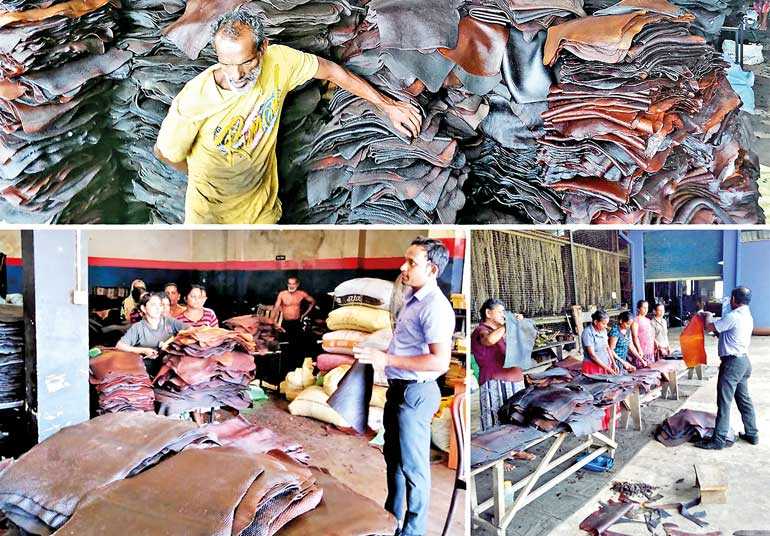Tuesday Feb 24, 2026
Tuesday Feb 24, 2026
Tuesday, 22 September 2020 01:17 - - {{hitsCtrl.values.hits}}

The warehouse of a natural rubber supplier to CEAT (above) and CEAT Kelani representatives conducting training for rubber suppliers (below)
Increased production to meet local demand has enabled CEAT Kelani Holdings to increase its monthly purchases of natural rubber in the domestic market by as much as 35% by September, the country’s leading tyre manufacturer has disclosed.
The company, which sources all of its natural rubber requirements locally, said its purchases in September 2020 alone would reach 500 tons (500,000kgs), generating Rs. 150 million in revenue for Sri Lankan producers in areas such as Kegalle, Kalutara, Ratnapura and Monaragala.
In the pre-pandemic months of December 2019 to February 2020, CEAT Kelani’s purchases of rubber averaged 366 tons a month, generating average monthly revenue of Rs. 107 million for local suppliers, the company said. “One of the major reasons for CEAT Kelani’s existence in Sri Lanka is the availability of natural rubber, and we have always been focussed on maximising local value addition,” the company’s Managing Director Ravi Dadlani observed. “With our ramping up of production in response to the temporary import restrictions imposed by the Government, our contribution to local natural rubber producers has increased sharply, by as much as 40% in value terms in just seven months.”
Increased production of truck, bus, radial and two-wheeler tyres by CEAT, while supporting the Government’s efforts to conserve foreign exchange through import substitution, would also help local industry achieve the ‘V’ shaped post-pandemic recovery that is expected of it, Dadlani said.
CEAT Kelani engages with a base of nearly 30 dealers for the purchase of natural RSS rubber and interacts with them on daily basis. Besides daily procurement transactions, the company imparts knowhow to the dealers to help them improve the quality of RSS grades. “We periodically audit dealers’ operations and help them maintain high quality standards,” Dadlani added. “As a result many of our dealers are now recognised as ‘CEAT approved NR dealers’. This recognition not only helps them to be consistent suppliers to CEAT Kelani, it also helps them to establish themselves as quality suppliers of RSS grades to rest of the local industry.” CEAT’s ramping up of production of truck and bus tyres since the start of the pandemic-linked lockdown has resulted in the company now producing 100% of the segment’s requirements and enabled the government to make a saving of Rs. 11 billion a year in foreign exchange. The company has also achieved an 85% increase in the production of tyres for the ‘two-wheeler’ segment over the past three months; enabling a further saving of Rs. 350 million a year through import substitution.
CEAT Kelani can currently produce two million tyres annually across multiple categories, and an addition of a further 200,000 car and van radial tyres is imminent with new machinery being installed, pending the arrival of foreign technologists to commission the additional capacity. Notably, CEAT Kelani Holdings has kept the prices of its tyres unchanged since December 2019 to support customers and the economy, despite the additional investments made in increasing capacity and an increase in market prices due to demand.
CEAT Kelani Holdings is considered one of the most successful India-Sri Lanka joint ventures in the manufacturing sector. The joint venture’s cumulative investment in Sri Lanka to date totals Rs. 8 billion, inclusive of Rs. 3 billion committed in January 2018 for expansion of volumes, technology upgrades and new product development. The company’s manufacturing operations in Sri Lanka encompass pneumatic tyres in the radial (passenger cars, vans and SUVs), commercial (Bias-ply and radial), motorcycle, three-wheeler and agricultural vehicle segments.